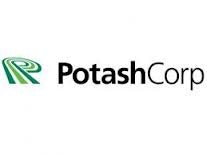
This caused a massive hemorrhaging in shares of potash producers, including Potash Corp./Saskatchewan (USA) (NYSE:POT), Mosaic Co (NYSE:MOS) and Intrepid Potash, Inc. (NYSE:IPI). These stocks each fell 20% or more on the day of the announcement.
In light of this news, is the entire industry doomed? Should investors rush for the exits while there’s still time?
A rude wake-up call
Shareholders of these companies had to be startled by the day’s news. After all, anything that causes companies worth billions to lose a fifth of their value in one day has to be Earth-shattering news.
Indeed, analysts were quick to slash price targets on these firms, citing the likely downward pressure on global potash prices.
Goldman Sachs wrote that although their previous expectations were for potash fertilizer to sell for $486 per ton in the second half of this year and $520 per ton next year, they now project potash prices to sink to $300 per ton.
Potash Corp./Saskatchewan (USA) (NYSE:POT) is the biggest company of the three by market value, and as a result, has the most to lose from this. Potash Corp./Saskatchewan (USA) (NYSE:POT) was performing very well to begin the year, both in terms of its share price as well as its underlying operations.
Potash Corp./Saskatchewan (USA) (NYSE:POT) reported earnings per share growth in the second quarter as well as the first six months of the year. Cash provided by operating activities in the first half of 2013 was $1.9 billion, a record for the company.
At that time, Potash Corp./Saskatchewan (USA) (NYSE:POT) guided investors to expect between $2.45 per share and $2.70 per share in full-year 2013 earnings. That means that after the massive sell-off, shares now exchange hands for just 12 times the midpoint of this year’s projected EPS.
As opposed to Potash’s success, Mosaic Co (NYSE:MOS) and Intrepid Potash, Inc. (NYSE:IPI) were struggling even before the Uralkali announcement, which certainly only makes things more dire going forward for the latter two.
Mosaic Co (NYSE:MOS)’s fiscal 2013 recently concluded; the company is not performing as well as Potash Corp./Saskatchewan (USA) (NYSE:POT). Mosaic Co (NYSE:MOS)’s 2013 diluted EPS stayed flat from the prior year, and net sales clocked in at $10 billion, down 10% from $11.1 billion the year prior.
This explains why Mosaic Co (NYSE:MOS) shares were actually down 6% year-to-date, even excluding the massive 20% drop on July 30.
Like Mosaic Co (NYSE:MOS), Intrepid Potash, Inc. (NYSE:IPI) also under-delivered when it reported its own first-quarter results. Diluted EPS fell 25% versus the first quarter of 2012, due largely to lower potash sales. The company sold 185,000 tons of potash in the first quarter of 2013 versus 203,000 tons in the same quarter last year.
Are dividends and buybacks enough of a cushion?
Potash, with its strong underlying fundamentals and high dividend yield, make it the best-in-breed potash fertilizer company.
With the Uralkali announcement, however, there are now opposing forces at work here, and it’s unclear which side will claim victory over the long term.
Potash is a very cheap stock, and I’m tempted to believe the 20% one-day haircut means the likely damage to Potash’s business is priced in.
At the same time, the company itself will probably revise its earnings guidance for the remainder of the year at some point, which will give investors a clearer picture of what to expect.
After the sell-off, Potash Corp./Saskatchewan (USA) (NYSE:POT)’s dividend yield is now 4.5%, and the company has increased its payout four times in the last seven quarters. Moreover, only one week ago, Potash announced a $2 billion share repurchase authorization to buy back 5% of its outstanding common shares over the next year.
Clearly, there are multiple margins of safety here, which investors can hang their hats on while the company endures this challenge. For those investors not afraid to buy when there’s blood in the streets, Potash certainly looks attractive. I’d wait for the dust to settle a bit, but should Potash continue to sell off, shares are quickly approaching bargain territory.
The article Is the Potash Industry Doomed? originally appeared on Fool.com and is written by Robert Ciura.
Robert Ciura has no position in any stocks mentioned. The Motley Fool has no position in any of the stocks mentioned. Robert is a member of The Motley Fool Blog Network — entries represent the personal opinion of the blogger and are not formally edited.
Copyright © 1995 – 2013 The Motley Fool, LLC. All rights reserved. The Motley Fool has a disclosure policy.


